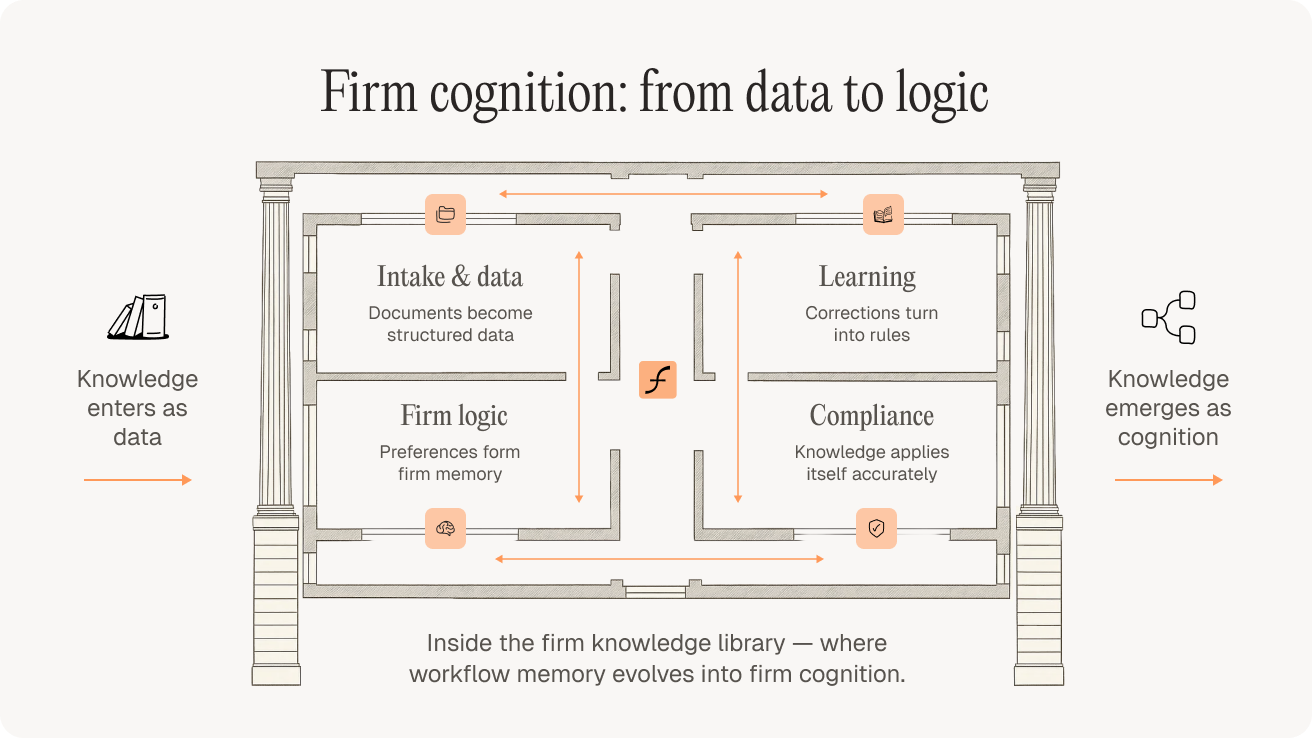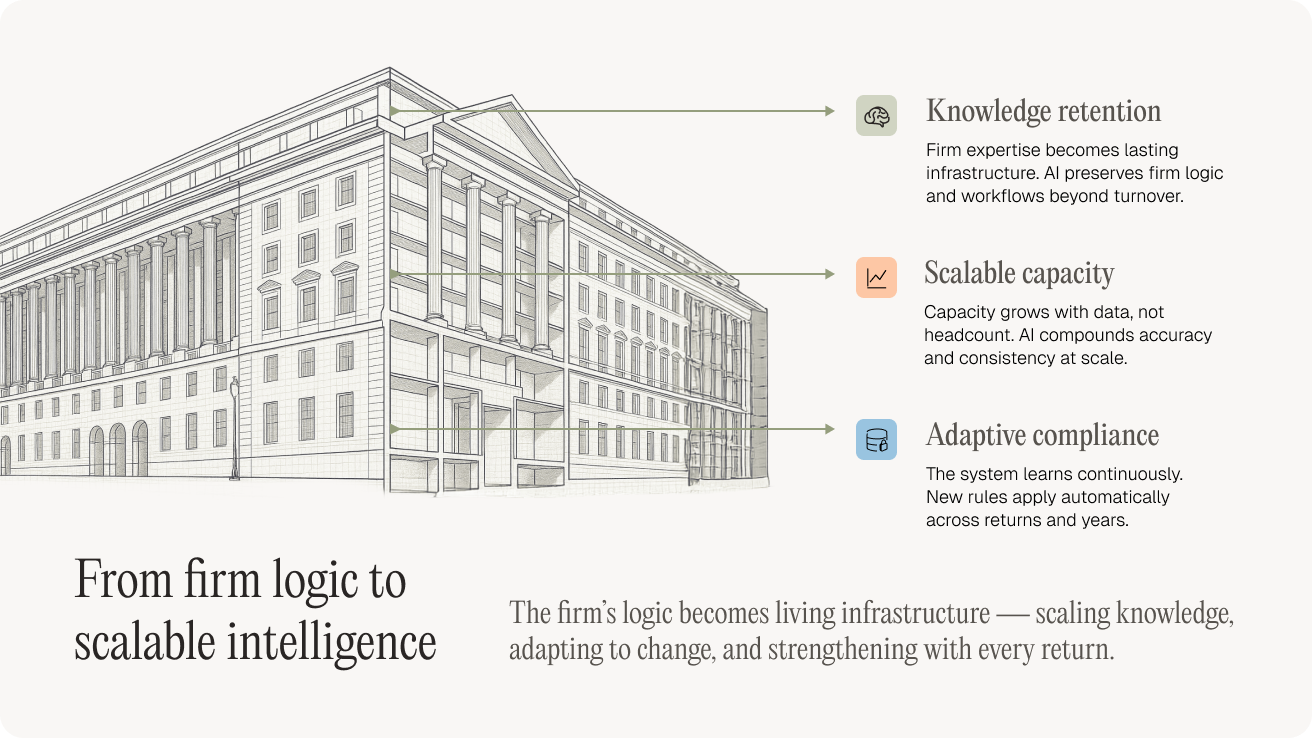Tax season is the same story every year. Hello endless paperwork, long hours, and too few staff to keep up. Firms push through with sticky notes, email chains, and “the way we’ve always done it.” The result? Bottlenecks, errors, and burned-out teams.
AI tax preparation is changing that, but the real leap forward isn’t just automation. It’s cognition. Today’s tax AI learns how your firm works, remembers your decisions, and applies them consistently. Welcome to the cognitive revolution.
The busy season bottlenecks explained
Too many returns in too little time? Busy season bottlenecks show up in the same ways every year:
- Data entry backlog: Hours are lost to typing from client docs.
- Review delays: Partners are stuck waiting for returns that aren’t review-ready.
- Missing information: Time is wasted chasing down incomplete submissions.
- Knowledge gaps: New staff are struggling without clear guidance.
A recent American Institute of CPAs (AICPA) survey highlights that finding qualified staff—a direct driver of capacity constraints—was ranked as the number one challenge for firms in 2024.1 The issue isn’t just headcount — it’s knowledge flow.
Defining AI memory in tax preparation
AI memory means the system doesn’t just execute rules. It learns your firm’s preferences, logic, and workflows. Think of it as a digital apprentice that:
- Sees how you calculate depreciation.
- Learns which schedules apply to certain industries.
- Remembers client-specific treatments from prior years.
- Applies your compliance rules and review thresholds automatically.
Over time, it builds a model of your firm’s way of preparing returns.
How AI retains firm logic and reduces errors
Data ingestion and automation
AI scans W-2s, 1099s, K-1s, bank statements, and prior-year returns. It doesn’t just extract numbers — it remembers how your firm handles them. If you always bucket real estate income a certain way, AI does the same automatically.
This creates a knowledge base specific to your firm. Instead of blindly following generic tax rule, it follows your firm's approach to those rules.
The technology can process almost any tax document, including:
- W-2s and 1099s of all types
- Schedule K-1s
- Prior year returns
- Bank statements
- Brokerage statements
Rules-based learning and continuous updates
Every correction becomes a lesson. Reviewers shift an entry, and AI records that adjustment. After a few cycles, it starts applying the correction itself. This creates a feedback loop that makes the system more accurate over time.
Tax law changes are updated regularly. AI memory ensures new rules get applied consistently, not just wherever someone remembered to change a checklist.
Cognition and compliance for scalable tax workflows

Integrating compliance checks
AI memory applies compliance rules throughout the return, not just at the end. It flags anomalies that match past problem areas, like missing 1099s, year-over-year swings, and inconsistent treatments.
Building a consistent review process
Returns arrive review-ready with:
- Docs linked directly to numbers.
- Supporting schedules already attached.
- Errors flagged and corrected early.
- Firm preferences already applied.
Firms using AI report review time drops by 50% or more.
Realigning staff roles and overcoming tax staff shortages
Delegating routine tasks to AI
AI takes over repetitive work:
- Data extraction
- Categorization
- Standard calculations
- Document organization
That’s 70–90% less time on grunt work. The payoff? Firms handle more returns without adding staff — and when staff leave, their knowledge doesn’t leave with them.
Empowering staff for advisory work
With routine prep automated, your team shifts to:
- Tax planning
- Multi-state compliance
- Entity restructuring
- Advisory and strategy
Clients get more value. Staff get more higher-level work. Retention improves, and margins grow.
Future-proofing your firm with AI-driven processes
AI memory transforms firm knowledge into an asset that doesn’t walk out the door when employees leave. This institutional knowledge becomes a permanent asset that helps your firm:

With AI memory, firms scale faster without adding staff, maintain consistent quality across all returns, onboard and train new staff quicker, and adapt seamlessly to law changes.
Unanswered questions about AI memory and firm knowledge
AI can’t replace judgment. It can’t interpret ambiguous tax situations, make ethical calls, apply professional judgment in gray areas, or manage client conversations. But it’s advancing fast, with more conditional logic and scenario handling expected in the next 12–18 months.
The takeaway: let AI handle the volume. Let humans handle the nuance.
Take the next step toward the cognitive revolution
AI memory is the next leap for firms battling busy season chaos. It preserves firm knowledge, reduces rework, and builds consistency at scale.
Filed’s platform is designed to retain firm logic, integrate with your software, and deliver review-ready returns without changing how you work. Explore how Filed works by joining the early access program: https://www.filed.com/early-access
FAQs about AI memory and firm logic
How does AI securely store tax data?
Filed uses bank-level encryption, SOC 2 compliance, and role-based access controls.
Will AI replace tax professionals?
No. It augments them by removing routine work and preserving firm knowledge.
Can AI integrate with current tax software?
Yes. Filed connects with Axcess CCH, Drake, ProSeries via open APIs.
How long before AI learns our logic?
Most firms see 80% accuracy within 4–6 weeks after processing 15–20 returns.
1 American Institute of CPAs (AICPA). “Finding Qualified Staff Tops Ranking of CPA Firm Top Issues.” Journal of Accountancy, June 6, 2024. Accessed October 3, 2025. https://www.journalofaccountancy.com/news/2024/jun/finding-qualified-staff-tops-ranking-of-cpa-firm-top-issues.html




.png)


